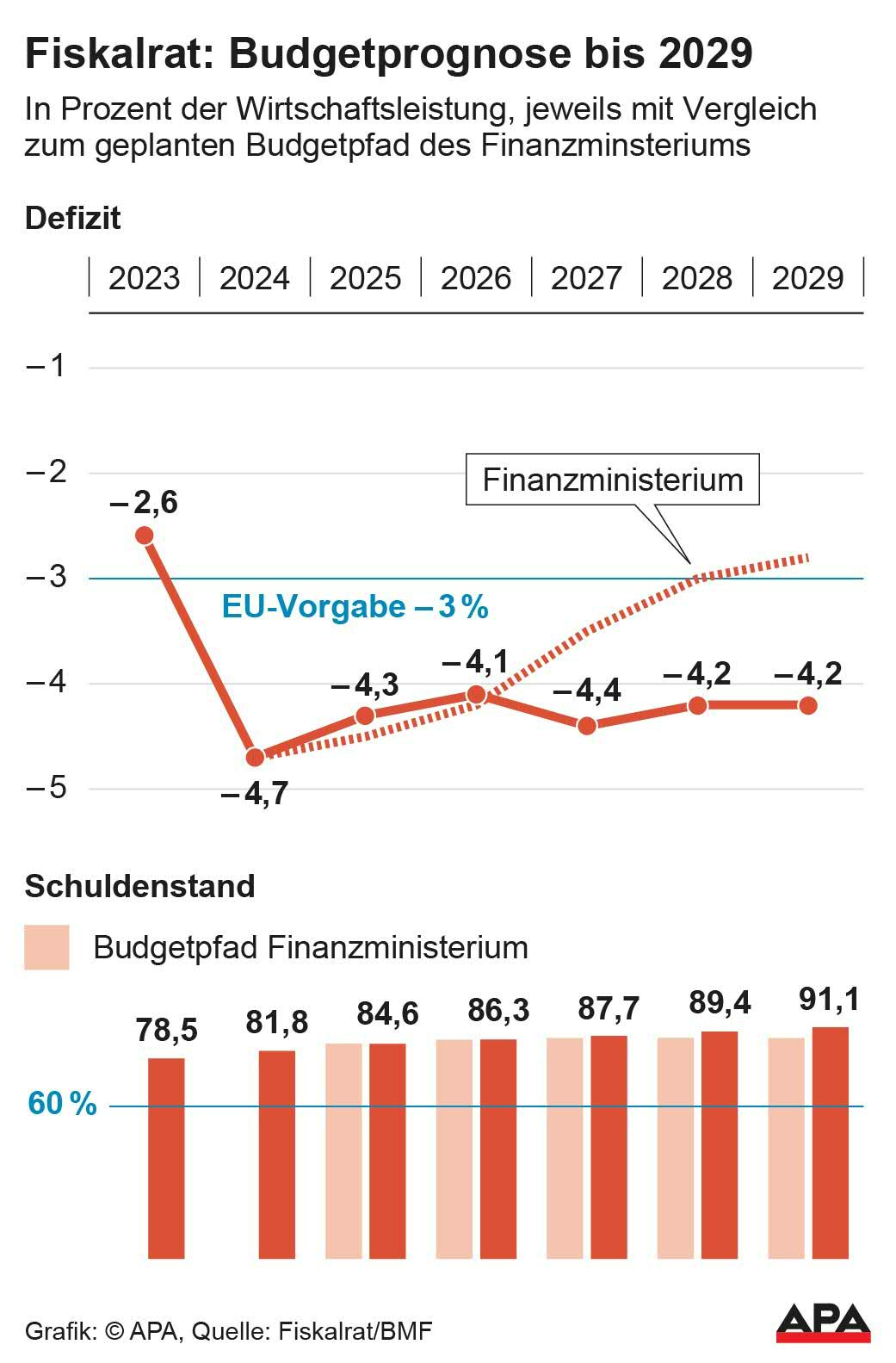Budget: Fiscal Council Expects Austria to Exceed Maastricht Limit in 2029

In a report presented on Monday, the fiscal council sees a "great additional need for consolidation" in the budget. After a deficit of 4.7 percent of GDP in 2024, a minus of 4.3 percent is expected this year, with the debt watchdogs forecasting only a decrease to 4.2 percent by 2029. This would clearly breach the Maastricht limit of three percent of GDP. Accordingly, the debt ratio would rise from 84.6 percent of GDP this year to 91.1 percent (2029).
Forecast Above Ministry Figures
The forecast is thus significantly above the figures of the Ministry of Finance in the medium term, which plans for 4.5 percent of GDP this year and 4.2 percent of GDP in 2026, and already foresees a drop below the Maastricht limit by 2028. The reason for this is that the fiscal council in its "Report on Compliance with Fiscal Rules" only considers those consolidation measures that have already been legally decided or at least sufficiently specified. Therefore, measures such as the anti-fraud package and savings that still need to be worked out in negotiations or newly established task forces - for example, in states, municipalities, and social insurance carriers or in subsidies - were not included.

But even if all the measures planned by the government in the budget planning were taken into account, the fiscal council still arrives at a deficit of 3.2 percent in 2029. To achieve the deficit of 2.8 percent planned by the Ministry of Finance in that year, an additional 2.2 billion euros would need to be consolidated by 2029.
Marterbauer Feels Reinforced
Finance Minister Markus Marterbauer (SPÖ) feels reinforced by the assessments and recommendations of the fiscal council in a statement sent to the APA. The planned measures must be consistently implemented. In areas such as combating tax fraud, cutting subsidies, and personnel expenses, work is being done on concrete implementation. "At the same time, we are striving for a budget consolidation that is gentle on the economy and fair."
Overall, the consolidation path has already been embarked upon, said fiscal council office manager Bernhard Grossmann at a press conference. "But this is not a walk in the park, it's a rocky long-distance trail that should be traversed without a break." Overall, it has been possible to slow down the dynamics of the growing budget deficit - but with the measures taken so far, it cannot be sustainably reduced. And even if it is possible to return to the three percent deficit ratio by 2028 as targeted, it is not over, said Grossmann. Due to the requirements to reduce the national debt ratio, Austria would then be allowed to incur a maximum of two percent of GDP in debt to be able to reduce its debt.
"Easily Formulated, but Hard to Implement"
The council has divided its recommendations into three phases: In the short term, the planned budget for 2025/26 must be consistently implemented. "This is not a given," says Fiscal Council President Christoph Badelt. "The recommendations are easily formulated, but hard to implement." A strict budget execution also means that states and municipalities must consolidate - this will be difficult enough when you look at the vague figures for Vienna alone. Furthermore, negotiations on structural reforms must begin now.
In the medium term - that is, by the end of the legislative period - the council finds the assumptions of the Ministry of Finance "too optimistic." On one hand, some measures like the halt in the valorization of family benefits are expiring and need to be extended or replaced by new steps. On the other hand, additional growth-promoting and climate-friendly measures are necessary, which in turn cost money and must be counter-financed by other consolidation measures.
For structural measures to begin to take effect, they must also be decided quickly. Almost all of them require the involvement of states and municipalities, says Badelt. This concerns reforms in health and care as well as more efficient fiscal federalism. "We also need a change in thinking from all public authorities. From the municipalities, it cannot be: 'We need more money because we are in trouble.'" The federal government would also like to say that.
Council Advocates for Increase in Effective Retirement Age
Only changes in pensions can be implemented by the federal government alone. The council advocates for an increase in the effective retirement age, and Badelt himself is also in favor of raising the statutory retirement age.
Even in 2029, consolidation is not over for the Fiscal Council. Subsequently, growth-promoting measures must be continued and refined. The same applies to structural reforms. Furthermore, a budgetary leeway must be created again.
(APA/Red)
This article has been automatically translated, read the original article here.





